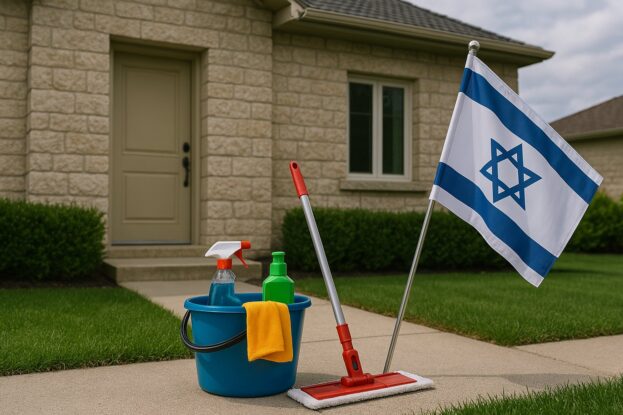As Pesach approaches, households across Israel begin their annual cleaning marathon. In a country where spring cleaning takes on religious significance, many families bring in outside help to tackle the pre-holiday deep clean. But whether you’re hiring someone for a one-off job before the holiday or rely on regular help throughout the year, it’s important to understand the legal, financial, and ethical responsibilities that come with employing cleaners in Israel.
When it comes to cleaning help in Israel, the law distinguishes between one-time or occasional cleaning jobs and ongoing employment. If you’re hiring Pesach cleaning help—say, a one-day deep clean of your kitchen—then you are not considered their legal employer. In this case, there’s no need to register with Bituach Leumi (National Insurance), and you’re not obligated to provide benefits or deduct taxes. However, if a cleaner works for you regularly—even once a week—you are considered their employer under Israeli law, and you must comply with a full set of labor obligations.
What obligations do you have to your cleaner?
As an employer of a regular cleaner in Israel, your obligations include:
- Registering the worker with Bituach Leumi and making quarterly contributions on their behalf
- Paying at least the legal minimum wage (currently 32.20 NIS/hour)
- Contributing to a pension fund—starting from the fourth month of employment, or immediately, if the cleaner already has a pension plan
- Providing paid vacation days (calculated proportionally)
- Accruing sick leave according to the law
- Paying for national holidays, if the cleaner normally works on that day and meets eligibility requirements
- Providing severance pay (pitzuim) after one year of continuous employment if the job ends
- Ensuring maternity leave rights and payment through Bituach Leumi, provided contributions have been made regularly
Failing to comply with Israeli labor laws for regular domestic workers can carry serious consequences—including personal liability for injuries, retroactive payments for benefits, government fines, and legal exposure in court. Even without a formal contract, a cleaner can be recognized as an employee. Taking simple steps to meet your obligations protects both you and your cleaner—and helps avoid costly disputes later.
For one-time or short-term Pesach cleaning help, however, these obligations do not apply. Still, it’s wise to put the terms in writing—even a quick message via WhatsApp—clarifying the date, hours, payment, and scope of work. It’s also recommended to confirm that the worker is responsible for their own insurance, because if an injury occurs in your home and the cleaner is not registered with Bituach Leumi, you could be personally liable.
What are the current rates and payment methods for cleaners?
Costs vary depending on location, demand, and the age and previous experience of the cleaner. Private cleaners typically charge between 75 and 120 shekels per hour, and rates often rise in the weeks leading up to Pesach. In large cities like Jerusalem and Tel Aviv, rates may be higher. Agencies generally charge between 100 and 150 shekels per hour, or offer a flat rate for a full-apartment deep clean, ranging from 1,200 to 2,500 shekels. While more expensive, agencies often provide the added peace of mind of legal coverage, vetted workers, and insurance.
Most private cleaners in Israel prefer to be paid in cash, by bank transfer, or through popular local payment apps, like Bit and Paybox. If you’re employing someone regularly, it’s important to keep a simple log of hours worked and payments made—even if no formal invoice is issued. While many domestic workers do not provide receipts, this doesn’t exempt the employer from their legal obligations. If you or your cleaner prefers working with official receipts, you can consult with an accountant or use a payroll service designed for household employers. This also helps with proper pension contributions and national insurance reporting.
Where can you find reliable cleaning help?
Most people in Israel find cleaning help through personal recommendations—via neighborhood WhatsApp groups, local Facebook communities, shuls, or schools. Word-of-mouth remains the most trusted method. Agencies are also popular, particularly among those looking for insured workers or short-term availability.
Pesach is the busiest season of the year for cleaning professionals in Israel. Many cleaners are booked weeks in advance, and rates can rise significantly as the holiday approaches. To avoid last-minute stress, it’s best to secure a cleaner 4–6 weeks before Pesach. If you’re looking for deep cleaning or multiple days of help, plan even earlier. Flexibility on timing and clear communication about expectations can also go a long way during this high-demand period.
What else do you need to know before hiring cleaning help in Israel?
Culturally, expectations are fairly straightforward. Cleaners typically use the homeowner’s supplies unless otherwise arranged. Offering water, coffee, or snacks during long cleaning sessions is appreciated and common. Many households also give a tip or small holiday gift before Pesach, especially to long-time or regular cleaners.
Hiring Pesach cleaning help can make the difference between a stressful rush and a smooth, manageable transition into the holiday. Just make sure that, whether it’s a one-time assist or a long-standing relationship, you’re aware of your legal obligations.
It’s important to stay informed about current labor laws and regulations, as they can change. Consulting official sources or legal professionals is recommended to ensure compliance with all legal obligations when employing domestic help.
In the meantime, wishing you all a chag kasher v’sameach! May we meet Next Year in Jerusalem!
The Buyitinisrael Editorial team is made up of industry experts, journalists, researchers, editors, and translators working together to deliver reliable, up-to-date information about the Israeli property market — all in English. With a strong focus on transparency and accessibility, our goal is to empower English-speaking buyers by helping them understand the market and navigate the real estate process with clarity and confidence.
For inquiries, email info@buyitinisrael.com.







